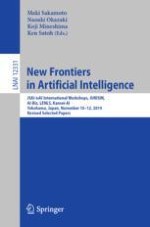2020 | OriginalPaper | Buchkapitel
Variables vs. Parameters in the Interpretation of Natural Language
verfasst von : Jan Köpping, Thomas Ede Zimmermann
Erschienen in: New Frontiers in Artificial Intelligence
Aktivieren Sie unsere intelligente Suche, um passende Fachinhalte oder Patente zu finden.
Wählen Sie Textabschnitte aus um mit Künstlicher Intelligenz passenden Patente zu finden. powered by
Markieren Sie Textabschnitte, um KI-gestützt weitere passende Inhalte zu finden. powered by
